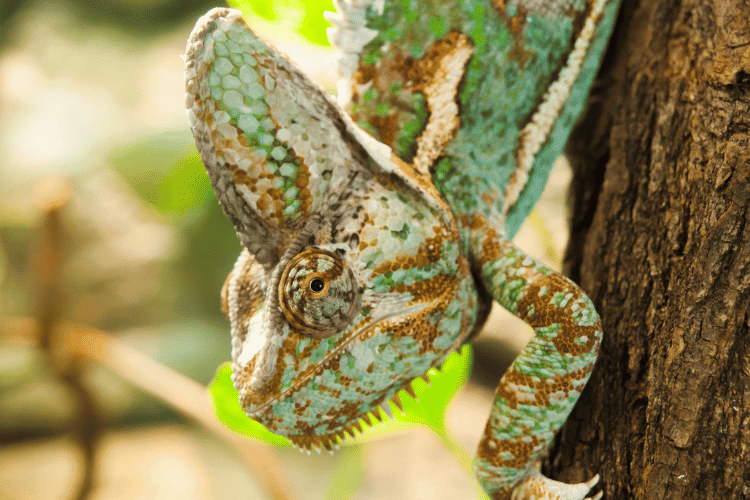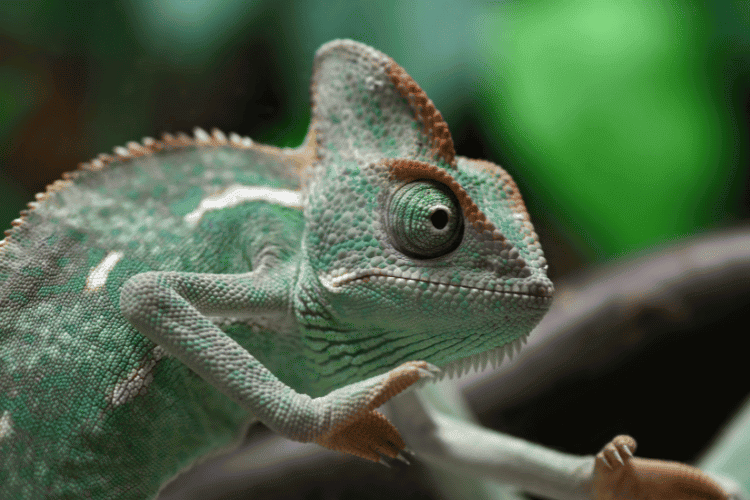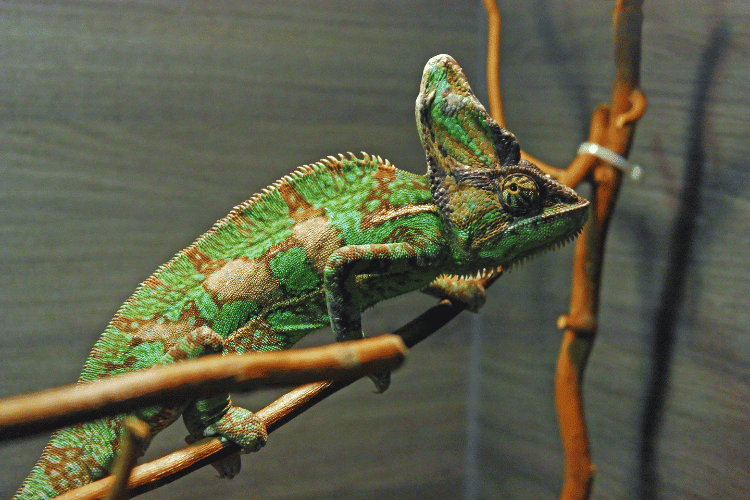If your veiled chameleon won’t open its eyes, you’re not the only chameleon owner who wants to understand why.
Chameleons are known for their unique behaviors, and when those behaviors change from the norm, it can be worrying.
This article will address the common question of why your veiled chameleon’s eyes are closed and what you should do about it.
While sometimes it might be as simple as sleep, it’s important to understand when closed eyes signal underlying issues, such as emotional stress or health problems. Taking quick action can be the difference when ensuring your chameleon’s well-being.
Understanding Chameleon Behavior

To know why your veiled chameleon’s eyes remain closed, it’s important to first understand their typical behavior patterns.
Normal Chameleon Eye Behavior
The eyes of healthy chameleons can move independently, giving them an impressive field of vision. Their eyes are constantly scanning their surroundings.
If you’re used to your chameleon closely observing its environment, then closed eyes during the daytime become a cause for concern.
Sleep Patterns in Chameleons
Chameleons have unique sleep patterns. Unlike some animals that can take short naps during the day, chameleons typically remain awake during daylight hours.
They conserve their sleep for the nighttime when their surroundings naturally darken, replicating their behavior in the wild where the transition from day to night is gradual.
When Closed Eyes Are a Problem
When your chameleon starts displaying closed eyes during daylight, it’s a sign that something may be amiss. Chameleons don’t typically nap during the day while perched on branches or in their enclosures.
Closed eyes in these circumstances often indicate an underlying issue; either extreme stress or an illness that needs prompt attention.
Potential Reasons for Closed Eyes
Now, let’s explore the main reasons why your veiled chameleon may be keeping its eyes closed during the day.
Emotional Stress
Chameleons’ Solitary Nature
Chameleons are solitary and shy creatures. They prefer alone time and aren’t fond of prolonged contact with humans or other chameleons.
Unlike dogs or cats, they don’t show affection by falling asleep on you.
Signs of Stress
When chameleons become stressed, they react differently from aggressive pets. They tend to shut down emotionally, which can manifest as closed eyes.
Some signs of stress to watch for include:
- Darker or brighter coloration
- Hiding behind branches
- Rocking back and forth
- Loss of appetite
- Watery feces
- Changes in body temperature
- Attempts to escape from their enclosure
- Scratching the enclosure’s bottom
- Uncharacteristic aggression.
Causes of Stress
Stress can be caused by many factors, such as housing multiple chameleons together, keeping them in high-traffic areas, or exposing them to loud noises.
Even changes in their enclosure layout, water presentation, or environmental conditions such as temperature and humidity can stress them out.
Ensuring a stress-free environment is vital for their well-being.
Health Issues
Veiled chameleons can be If you suspect you chameleon has any of the health issues below, please speak to a vet as soon as you can.
Bacterial Infections and Respiratory Problems
Veiled chameleons can suffer from bacterial infections, with respiratory infections being the most common. These infections compromise their lung function, making breathing difficult.
Signs of respiratory infections include nose-raising, gaping, and labored breathing. Timely detection and veterinary assistance are crucial.
Parasitic Infections
Parasites, picked up through food or unsanitary conditions, can lead to symptoms like a swollen stomach area, weakness, slimy feces, dehydration, and loss of appetite.
A fecal test at the vet can diagnose parasitic infections.
Viral Infections

While rare, viral infections can cause chameleons to waste away. They typically don’t respond to treatments, and testing is challenging. If suspected, consult a reptile-savvy vet for guidance.
Other Factors
Chameleons can also suffer from fungal infections, vitamin A deficiencies, metabolic bone disease, thermal burns, edema, egg retention, stomatitis, and more.
Each condition requires specific care and treatment, making professional vet assistance invaluable.
Preventive Measures and Husbandry
Maintaining the right conditions for your veiled chameleon is essential to prevent health issues and keep those eyes wide open.
Let’s delve into some straightforward practices for optimal chameleon care.
Maintaining Proper Husbandry Conditions
Temperature and Humidity Levels
Chameleons thrive in specific temperature and humidity ranges. Ensure a temperature gradient in their enclosure, with cooler areas around 70-80 degrees Fahrenheit and warmer spots at 80-85 degrees Fahrenheit.
Maintain humidity levels between 50-75%. Monitoring and regulating these conditions is vital for their well-being.
Enclosure Setup and Layout
Chameleons, especially adult chameleons, appreciate familiarity with their surroundings. Avoid sudden changes or frequent rearrangements in their enclosure, allowing them to feel secure and comfortable.
Water Presentation
The way water is provided matters. Ensure water is neither too cold nor presented too suddenly or strongly, as it can stress your chameleon. Maintain a suitable water source for hydration.
Avoiding Common Husbandry Issues
- Housing Multiple Chameleons Together: Chameleons are solitary creatures and prefer to be alone. Housing them together can cause stress and aggression, leading to health problems.
- High-Traffic Areas and Loud Noises: Keep your chameleon’s enclosure away from busy areas to minimize stress from human movement and noise.
- Environmental Stressors: Pay attention to potential stressors, like frequent handling or exposure to other pets. Minimize disturbances to help your chameleon thrive.
Recognizing Early Signs of Illness
Familiarize yourself with the early signs of illness, such as changes in coloration, behavior, or appetite. Early detection allows for quicker intervention and better chances of recovery.
If you suspect an issue, don’t hesitate to consult an experienced reptile veterinarian.
Seeking Veterinary Assistance
When it comes to your veiled chameleon’s health, professional guidance is invaluable. In this section, we’ll cover the importance of seeking help from experienced reptile veterinarians and how to prepare for a vet visit.
Importance of Experienced Reptile Veterinarians
Not all veterinarians are well-versed in reptile care, so it’s crucial to find a vet with expertise in chameleons. These specialists understand the unique needs of your pet and can provide accurate diagnoses and treatments.
Documenting Symptoms for Vet Visits

Before visiting the vet, it’s helpful to document any concerning symptoms. If your chameleon keeps its eyes closed, take a video of the behavior before disturbing them.
This allows the vet to see what’s happening without your chameleon putting on a defensive display during the visit.
Treatment Options and Medication Selection
Depending on the diagnosis, treatment options may vary. For bacterial infections, antibiotics may be prescribed, while parasitic infections require anti-parasitic medications. The vet will give you recommendations about medication selection and dosage.
The Vet’s Role in Diagnosing Infections
Reptile veterinarians have the expertise to diagnose various infections accurately. While some symptoms may not be apparent at home, a skilled vet can run tests, such as fecal examinations or blood work, to pinpoint the issue.
Remember, if your veiled chameleon shows signs of illness, it’s always better to seek professional help sooner rather than later.
Chameleons are masters at masking their discomfort, so early intervention can significantly improve their chances of recovery.
Wrapping Up
Closed eyes during daylight are a clear signal that something may be wrong with your veiled chameleon. Whether it’s emotional stress or underlying health issues like bacterial infections, parasites, or other ailments, timely action is vital.
By providing the right conditions, avoiding common mistakes, and recognizing early signs of illness, you can make a healthy environment for your chameleon.
However, when problems arise, don’t hesitate to consult a reptile vet. Their expertise can make all the difference in ensuring your veiled chameleon’s well-being, and those captivating eyes will remain open and vigilant with proper care.



